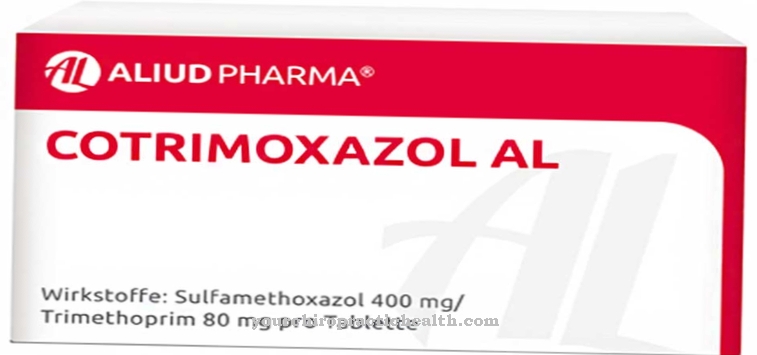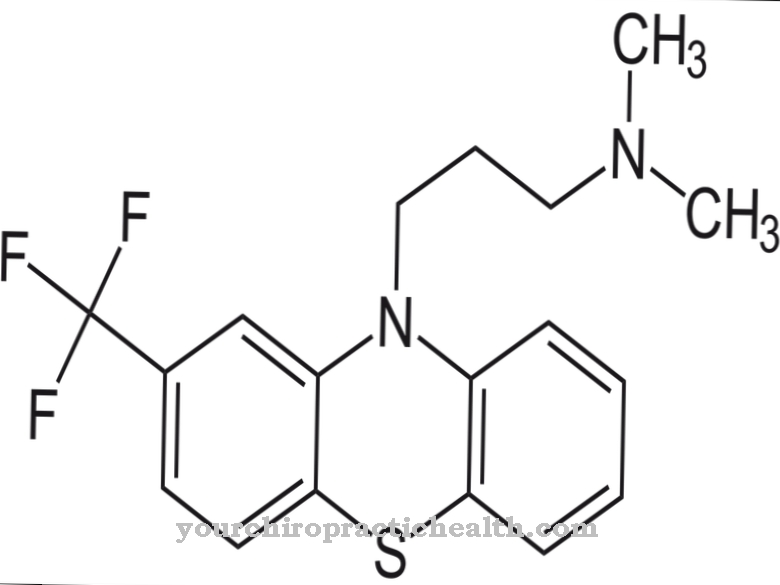The preparation was developed Abciximab by the US pharmaceutical company Centocor as an effective means of preventing blood clotting. The preparation, which is used exclusively in clinical treatment, is used for surgical interventions on the arteries of the heart and for the prevention of heart attacks. The most common side effects include bleeding, which can occur up to 36 hours after starting therapy.
What is abciximab?

With abciximab, also called Abximabum is an active ingredient that is primarily used in heart surgery. It therefore belongs to the group of platelet aggregation inhibitors.
The basis of the preparation is an immunologically effective protein that prevents the formation of blood clots. The clots can clump the blood together, clogging the arteries and ultimately leading to a heart attack.
To prevent clots from forming, abciximab attaches to various receptors on the red platelets. The active ingredient is used if complications with regard to blood flow to the heart are feared during an operation. In addition, the preparation is used in heart attack prevention.
Pharmacological effect
Blood clots form in the human body when the body's own proteins such as fibrinogen attach to the red blood cells. This protein plays an important role in a healthy body: It promotes blood clotting and thus contributes to the rapid closure of a wound and to wound healing.
This mechanism can cause problems in patients with circulatory disorders. This is because the platelets connect with each other and can attach themselves to the walls of the blood vessels. Abciximab prevents the protein from docking by itself docking with the glycoprotein IIb / IIIa receptors and preventing blood clotting for a period of up to 24 hours. Because of this mode of action, abciximab is considered an antagonist.
These are substances that themselves have no pharmacological effect. However, their presence prevents other substances from developing their effects. When given intravenously, abciximab binds to platelets within ten to 30 minutes. The active ingredient is one of the fast-acting preparations.
Medical application & use
In cardiac surgery, abciximab is used in interventions in which pathologically narrowed arteries are to be widened. This can be done by balloon dilatation or by atherectonomy. Here a balloon or catheter is inserted into the artery.
Abciximab is given to prevent platelets from attaching to the foreign body, which can block the artery. Abciximab is administered via infusions lasting at least twelve hours. That is why the preparation is only used in clinics. Abciximab is often given in combination with other preparations that support the effect. Tried and tested combinations are abciximab in conjunction with heparin or acetylsalicylic acid.
Abciximab is used preventively in patients who suffer from angina pectoris and cannot otherwise be treated. Patients experience attacks of chest pain. Triggers are circulatory disorders caused by constrictions in the coronary arteries. The bottlenecks are caused by deposits on the blood vessels. Abciximab is said to reduce the risk of these deposits loosening and completely clogging an artery.The preparation is used in heart attack prevention if the person concerned does not respond to any other therapy.
Risks & side effects
Because abciximab prevents blood clotting, the preparation must never be given to patients with internal bleeding. Bleeding occurs frequently within 36 hours of starting therapy.
Common side effects include nausea, vomiting, low blood pressure, chest and back pain, slow heartbeat, fever, and a reduction in red blood cell counts. In rare cases, allergic reactions, bleeding in the lungs, impaired function of the lungs, or fluids entering the pericardium can occur.
During pregnancy, the preparation should only be administered if it is unavoidable. It is not yet known whether and how the active substance will affect the unborn child.
























.jpg)



